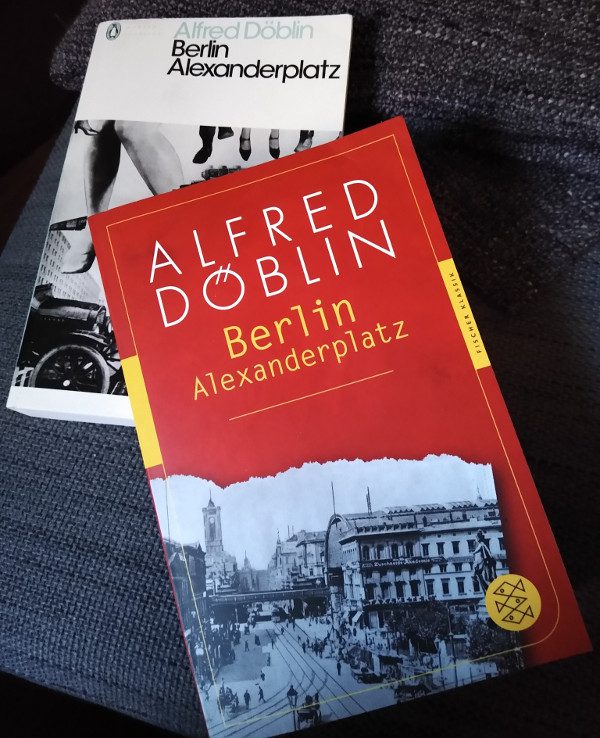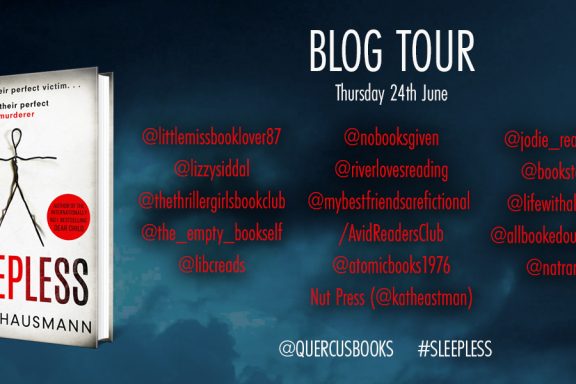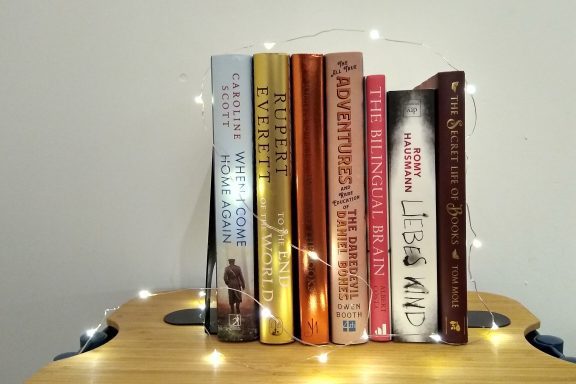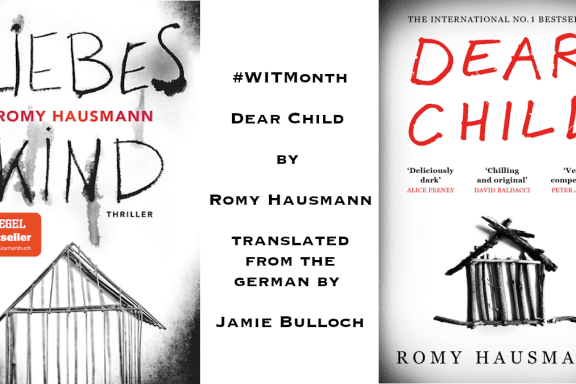 I made it to the end of week two but this was not without its challenges, either. Read on to find out why.
I made it to the end of week two but this was not without its challenges, either. Read on to find out why.
Chapters 3 – 5
- What do you make of Döblin’s structuring of the novel? The short summaries at the beginning of each chapter, each section? The montage technique? Initially, I wasn’t a fan of the short summaries at the beginning of each chapter. I’d much rather not know what’s coming when I’m reading than have an expectation and for it not to be delivered in the way I expect or for the surprise to be taken away from me.As I mentioned in my previous post on the first two chapters, I also struggled to understand what was happening with Döblin’s use of montages because there was no clear demarcation between these and the narrative. But by this point in my reading of the text, I was more used to them and found them as interesting in some cases as the story of Franz and his companions. They all go to give a better sense of the city which Franz moves around in and helped me to build up a better picture of Berlin at this time.
- Women and the treatment of women in Berlin Alexanderplatz …. Discuss. Ha! How long have you got?! I think this has to be an aspect of the novel which is particularly problematic for anyone reading it in 2019, especially if you’re a woman. But I did try my best to put aside my feminist outrage and read it as a novel of its time and about this section of society. That’s not to say that it didn’t colour my impression of the novel and I have to admit that I did consider abandoning the book at times.Even though we know why Franz was in prison, it still came as a shock to see that none of the women in this book are treated well. The men use the language of normal, loving relationships to describe the women but they’re acting as their pimps and living off the proceeds of the women’s relationships with other wealthier men, each side is aware of the other and seem okay with sharing their women, and the women appear to enjoy having the opportunity to be the providers for their men.The way that Reinhold and Franz agree that one passes off his cast-offs to the other when he becomes bored of them is digusting, and I disliked both men for entering into this arrangement with each other.They’re bizarre relationships to get my head around and I would have liked to have seen one good, more relatable relationship included which balanced this out a little.
- This section introduces Reinhold, who will prove to be Franz Biberkopf’s main antagonist. What do you think of Biberkopf’s initial underestimation of Reinhold? I think because Biberkopf’s life is taking a turn for the better and he is more sorted than he ever thought he would be on release day, this makes him blind to Reinhold’s potential dangers or faults.He also believes himself to be smarter than Reinhold and is too cocky about this. He seems almost over-ebullient about doing him a favour and thinks it a great lark, a game. He lets his defences down and Reinhold manages to quickly gain Franz’s confidence, as a result.I worried that Franz was too open with him but I genuinely think that he felt so happy about the way things were going, he didn’t look for warning signs and only looked at the positives. And some people are very good at charming their way into our confidence and lives, as Reinhold does with Franz’s here.
- What was the highlight of this section for you? What the lowlight? What I enjoyed most about this section was Franz’s wanders around the city and the time spent in bars, the conversations he overheard or took part in. I was getting into the writing style and not finding the montages so much of a surprise, and this all helped to give me a feel for life in Berlin, and build up a picture of the city at this time.There were two low points and I can’t decide between them because they both made for difficult reading.One was the treatment of women in this novel, as mentioned above in response to question two, and the protracted, excruciating description of the slaughterhouse. That was tortuous to get through and I still don’t understand why it was included, unless it’s a metaphor for how people come in from surrounding areas to the big city and have the life beaten out of them in the process. Either that, or it’s to foreshadow something that’s coming later in the book, possibly?
- Do you have any further observations or questions you’ll be looking to answer at a later stage? Well, as I said above, I want to see what purpose that lengthy description of the slaughterhouse serves, and whether it’s picked up and alluded to later in the novel.I can’t see that Franz taking on Reinhold’s cast-offs is going to end well, but I’m also interested to see what additional role Reinhold plays in Franz’s story.I’m not sure I like Franz any better at this stage but I am getting more of a feel for his character and am starting to enjoy the dialogue; it’s ranty, opinionated, belligerent, but it has a real energy about it which I’m especially enjoying.
I’m getting into the novel now and am not finding its idiosyncracies so off-putting, so I think I’m going to keep going and find out how things turn out for Herr Biberkopf.



1 Comment